The UK investment bank, Sapien Capital Ltd, has been fined £178,000 by the Financial Conduct Authority (FCA) for failing to have adequate controls and procedures to monitor transactions that posed fraudulent trading and money laundering risks.
What’s the significance of transaction reporting in this incident?
This fine reinforced the importance of complete and accurate transaction reporting in detecting fraudulent activity under MiFIR as this is what enabled the FCA to piece together the trading patterns of organised criminal activity. FCA’s announcement also demonstrates their competence and determination to detect compliance failures within the market.
What happened?
For an extended period during 2015, Sapien Capital failed to enforce adequate systems and controls to identify and mitigate the risk of being used to facilitate fraudulent trading and money laundering in relation to business introduced by four authorised entities known as the Solo Group.
The circular pattern in which the trades by Solo Group were conducted, as well as the significant scale and volume was flagged by the FCA as highly suggestive of financial crime and appear to have been undertaken to create an audit trail to support withholding tax reclaims in Denmark and Belgium.
Sapien Capital also failed to exercise due skill, care and diligence in applying its AML policies and procedures. They also failed to properly to assess, monitor and mitigate the risk of financial crime in relation to the Solo Clients and the purported trading.
What can be drawn from FCA’s fine?
- The past isn’t the past – Sapien’s breaches occurred more than five years ago. It is incredibly important to inform the regulator of any breaches as soon as they happen or are identified in addition to performing remediation where possible.
- Review your systems – firms are expected to have systems and controls that test the purpose and legitimacy of transactions, reflecting scepticism and alertness to the risk of money laundering and financial crime. Failure to do so constitutes serious misconduct.
- Check your reporting – ensuring that your transaction reports are accurate and complete is not only about assisting regulators, it enables firms to identify suspicious activity in the first instance.
If you want to know more about improving the accuracy of your reporting, we suggest reading the following articles:
- The 3 Most Common Errors in MiFIR Transaction Reporting;
- FCA identifies 5 common MiFIR reporting errors; and
- MiFIR Reconciliation.
Please contact us should you need any clarification or assistance with your reporting obligations.




